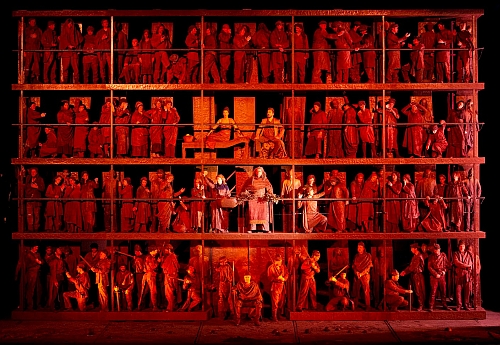Enescu: Oedipe: Soloists, Chorus and Orchestra of Teatro Colón, Ira Levin (conductor), Teatro Colón, Buenos Aires. 1.6.2012. (JSJ)
Cast:
Oedipe: Andrew Schroeder
Tiresias: Esa Ruuttunen
Creon: Robert Bork
Shepherd: Gustavo López Manzitti
High Priest: Fabián Veloz
Phorbas: Alejandro Meerapfe
Watchman: Lucas Debevec
Teseo: Gustavo Zahnstecher
Laius: Enrique Folger
Jocasta: Natascha Petrinsky
Sphinx: Guadalupe Barrientos
Antígona: Victoria Gaeta
Mérope: Alejandra Malvino
Theban woman: Cintia Velázquez
Production:
Direction: Alex Ollé and Valentina Carrasco
Sets: Alfons Flores
Costumes: Lluc Castells
Lighting: Peter Van Praet
Chorus: Peter Burian
Children’s chorus: César Bustamante

In this coproduction with the Théâtre Royal de la Monnaie in Brussels, where it was premiered last November, and the Gran Teatre del Liceu in Barcelona and National Opera of Paris, Enescu’s only opera Oedipe has been given its Argentine premiere, with more than usual interest from the opera going public.
A production from La Fura dels Baus, it has received the full “lenguaje furera”, i.e. that it is very much a visual spectacle, with powerful and intense imagery, slickly executed. In the program notes La Fura’s Alex Ollé, who was responsible for the conception, mentions concepts such as “the eternity of Oedipus” and “the interrelationship of mythical and historical time”, leading to a juxtaposition of “fragments and quotes from different epochs” with “recognizable historical elements” and the “fabulous”. But not all of this is obvious, such as the Sphinx – “the great controller” – appearing as the pilot of a downed Luftwaffe plane.
The work sets out to be a complete telling of the Oedipus myth from birth, including the history in Sophocles’ Oedipus Rex up to his final days in the forest of Colona, and this production opens with the cast bathed in an earthy red on a four-tier structure with lines of terracotta statues. These statues – a testimony to the life of the protagonist – form a constant feature in similar side galleries throughout much of the rest of the work, which is mostly sombrely, but masterfully, lit.
The chorus has a lot to do in this work and did it very well. Similarly the role of Oedipe is very demanding and Andrew Schroeder was a powerful protagonist, both vocally and dramatically. Others standing out in the strong cast were Robert Bork’s commanding Creon and Natasha Petrinsky’s convincing Jocasta, and among our local singers Guadalupe Barrientos’ remarkable Sphinx.
Conductor Ira Levin clearly relished the dark complex score and elicited a memorable performance from the Colón orchestra.
Jonathan Spencer Jones